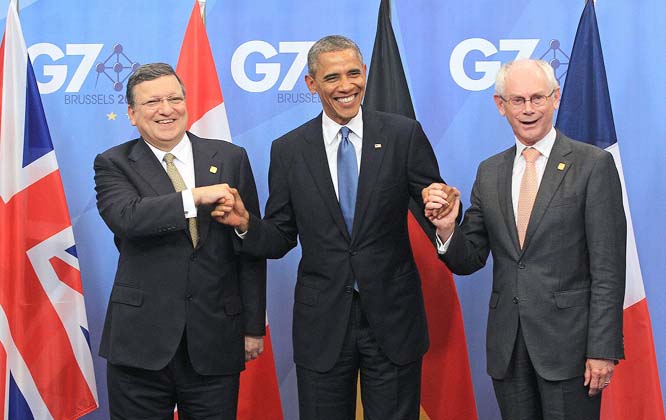
AP, Brussels :
Russian President Vladimir Putin was kept out of Wednesday’s summit of world leaders but dominated the meeting as US President Barack Obama and his counterparts from the G7 group of major economies sought the Kremlin chief’s renewed cooperation to end the Ukraine crisis.
French President Francois Hollande said the meeting sent a clear signal of unity by urging Russia to help stabilize the situation in Ukraine, while keeping the threat of further sanctions on the table.
In faraway Moscow, Putin seemed to shrug off the snub of having not been invited to Brussels, but declared he was still open to “dialogue.”
In March, the US and its most important allies retaliated for Putin’s military occupation and subsequent annexation of Ukraine’s Crimean Peninsula by suspending Russia’s membership in what had been the G8 club of rich countries. They also nixed Putin’s plan to hold the meeting in Sochi, the city Russia lavished billions on to host the 2014 Winter Olympics.
Around the dinner table in Brussels, “there were seven of us, not eight,” Hollande said afterward. But the leaders “were speaking in one voice” and reached the same conclusions.
“And everyone must hear them, and especially the one who wasn’t here,” he said, referring to Putin.
In a joint statement, the leaders of the US, Canada, Japan, Britain, France, Germany and Italy urged Russia to recognize the results of Ukraine’s recent presidential election, complete the withdrawal of its troops on the border with Ukraine and stop the flow of weapons and militants.
“We stand ready to intensify targeted sanctions and to implement significant additional restrictive measures to impose further costs on Russia, should events so require,” the leaders warned.
But the tough language couldn’t hide the fact that many US allies, especially the Europeans, have shifted their focus toward re-engaging with Putin since Russia has refrained from a full-blown invasion of Ukraine and started pulling back its troops.
Hollande, British Prime Minister David Cameron and German Chancellor Angela Merkel are all planning to hold talks with the Russian president in France during ceremonies marking the 70th anniversary of the D-Day invasion this week.
Obama, however, has no plans to meet with Putin, a clear indication the US is more reluctant than its European peers about renewing the dialogue. Speaking in Poland on Tuesday, Obama announced new military measures meant to reassure NATO allies in Eastern Europe worried about Russia.
Putin, in turn, lambasted American foreign policy as aggressive and militaristic but told French television network TF1 and radio Europe-1 he would still agree to meet Obama. “I’m always ready for dialogue,” he said.
The Europeans, who get oil and gas from Russia and are eager to do business there, were never that keen to isolate Moscow. Germany always stressed it wanted to maintain a constructive dialogue with Russia, and France has even continued building warships for the Russian Navy.

